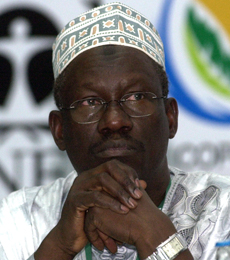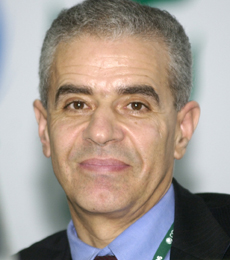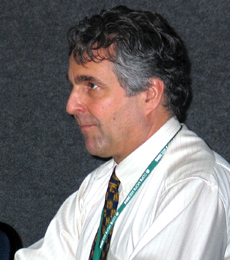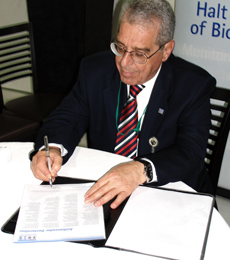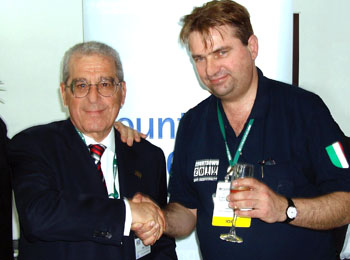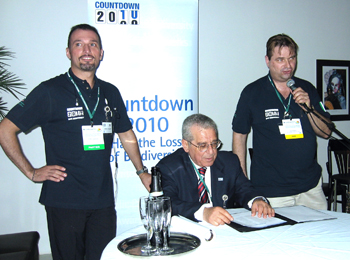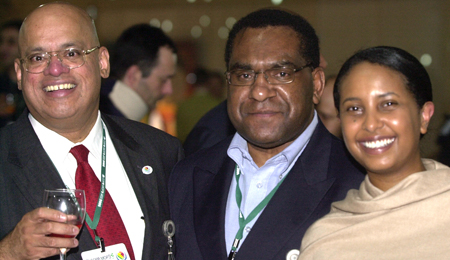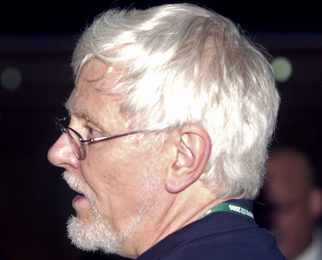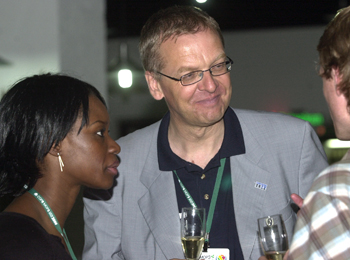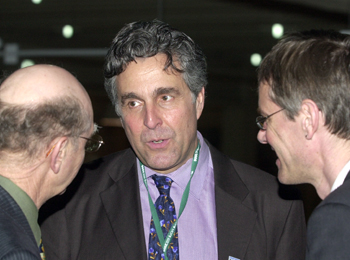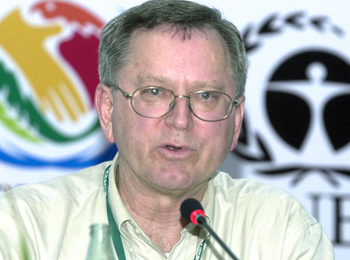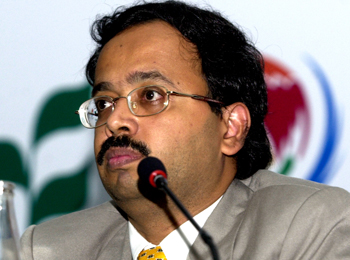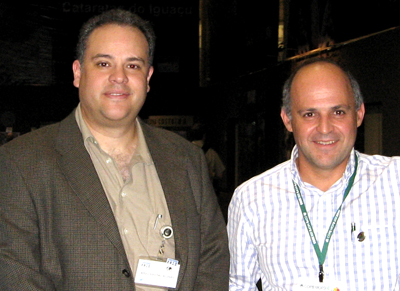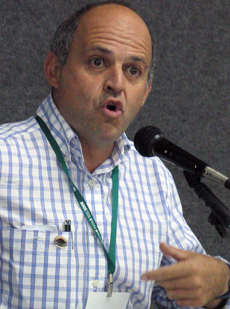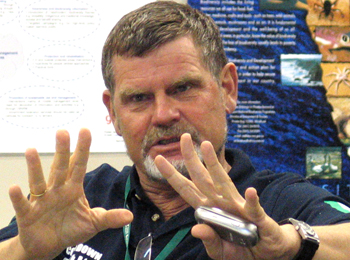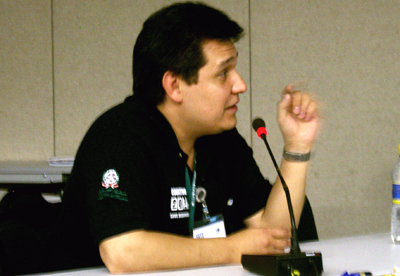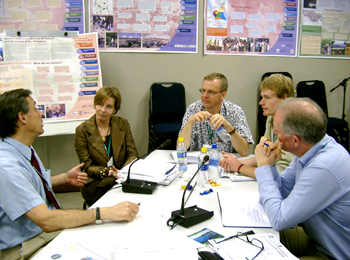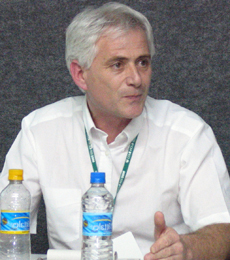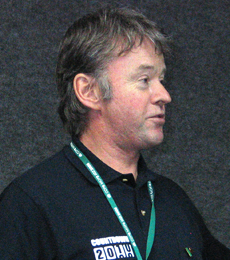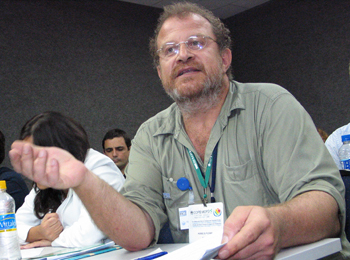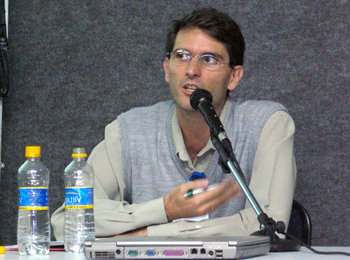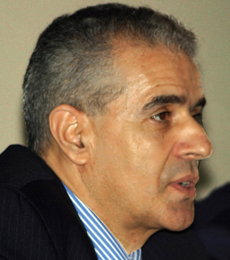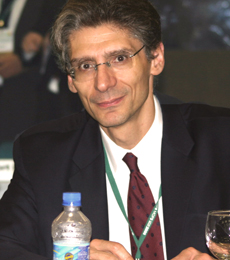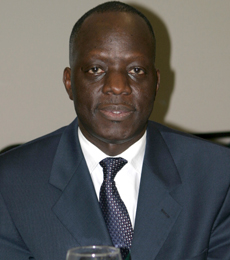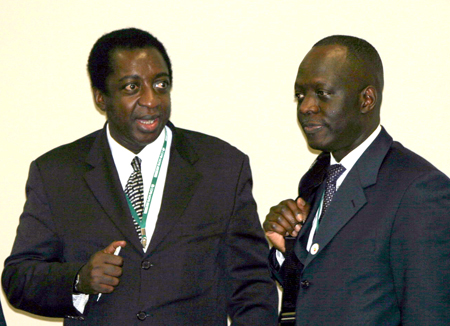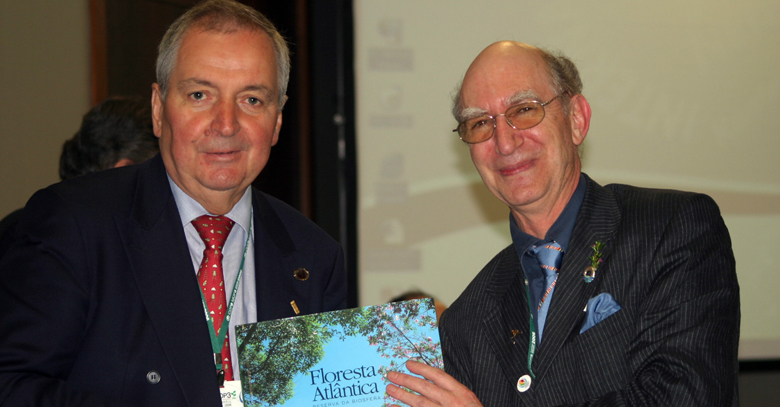 |
||
|
published by IISD, the International Institute for Sustainable Development
in cooperation with the CBD Secretariat |
|||
|
A Special Report on Selected Side Events at CBD COP-8
|
|||||
| 20-31 March 2006 | Curitiba, Brazil | |||||
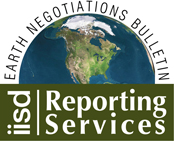 |
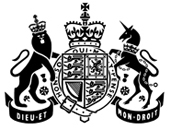 |
||||
 |
|||||
|
United Kingdom Foreign & Commonwealth Office
|
|||||
Events convened on Saturday, 25 March and Sunday, 26 March 2006
|
2010 Biodiversity Forum: Sustainable Ways to Conserve and Equitably Share Biological Diversity: Implementing the 2010 Targets Curitiba, Brazil, 24-25 March 2006 |
|||
The Global Biodiversity Forum (GBF), founded in 1993, is a multi-stakeholder forum aiming to foster partnerships and critical dialogue on biodiversity issues, and assist policy making and implementation of the CBD and other biodiversity-related conventions, but does not intend to pursue consensus.
According to forum participants, the Convention process reached a turning point with the adoption of the 2010 target, which was initiated in 2002, as it signaled a shift from a focus on policy development to implementation. A majority of participants at this session of the forum noted that renewed energy is required to complete this transition, and that the GBF can serve this purpose. They also stressed the urgent need to translate biodiversity objectives into concepts that resonate with the general public in order to achieve greater support.
There was broad recognition that streamlining the 2010 target with other development processes, particularly the MDGs, can channel opportunities and lessons learned to make the 2010 a tangible target, while linking biodiversity conservation to poverty reduction. Participants indicated concurred that there is no more time for “business as usual.”
There was widespread consensus that conventional sources of funding must be diversified to meet the amount anticipated to be required to meet the 2010 targets, and that governments should provide an enabling environment for this, including payment for ecosystem services (PES). Another main theme was that government ministries traditionally associated with environmental issues must be encouraged to reach out to those associated with finance and trade to make them champions of biodiversity interests. Further civil society and private sector engagement was also supported by all participants.
Organizers expressed concern over funding shortages which may hinder the continuation of the GBF in future years, and urged participants to assess the validity of this initiative, which could facilitate in securing funding from conventional GBF partners.
The outcomes of the GBF will be presented at the CBD COP 8 Plenary, on Wednesday, 29 March.
|
|
|||
|
2010 Biodiversity Forum Reception |
|||
At the end of the opening of the GBF 2010 Biodiversity Forum, the Countdown 2010 Secretariat hosted an evening reception sponsored by the Italian Ministry for the Environment and Territory.
Recognizing the personal efforts of Dr Aldo Cosentino, Director General for Nature Protection of the Italian Ministry, in ensuring the full involvement of
The reception was attended by about 200 delegates, accompanied by Brazilian music and organic Italian wine.
|
2010 for 2015: Reaffirming the Role of Biodiversity in Achieving MDGs |
|||
|
This workshop focused on ways and means to link conservation (2010 target) and development (MDGs) in a manner which facilitates country-level implementation and reporting actions, while placing biodiversity as a cross-cutting issue in achieving not only MDG 7 but other MDGs as well. Participants noted the inadequacy of environmental indicators in development frameworks such as MDGs, Poverty Reduction Strategy Papers, considering the trade-offs between development and conservation strategies, recognizing the need for the UN Secretary General and CBD Parties, in identifying targets and indicators, to better integrate biodiversity across all MDGs. Participants recognized that formally adopting the 2010 targets as one of the MDG targets would renew interest in biodiversity issues, while stressing the need to disaggregate MDG target 9 (integrating principles of sustainable development into national policies, and reversing the loss of environmental resources) to facilitate measurability and performance monitoring. Participants emphasized the need for socio-economic indicators within the 2010 target, and better understanding of results-based indicators to achieve 2010 targets at the national level. The relationship between trade and environment was also a major issue, with participants agreeing that full liberalization might lead to increased biodiversity loss, and that biodiversity contributes to productive systems. Participants also identified the need to better understand the relationship between poverty reduction and conservation needs through the use of scenarios to enhance understanding about potential trade-offs. Participants questioned the validity of using PES as a potential incentive measure to achieve the 2010 target, while indicating the need for further scientific evaluation. Noting the PES case in Costa Rica, participants discussed how PES has become a major income source for local and indigenous communities, as key service providers. |
|||
|
|||
|
|||
|
Thinking Global and Acting Local: Taking 2010 Forward |
||
|
This workshop looked at mechanisms to translate promising local initiatives into policy (“upscaling”) and attempted to find better alternatives of translating higher-level policies and targets into local-level actions (“enabling”) aimed at reducing biodiversity loss.
Participants indicated that biodiversity loss is accelerating in many parts of the world, but at the same time the sense of urgency that was present at Rio in 1992 seems to have been lost in protracted negotiations concerned with less significant issues. They agreed that successful biodiversity conservation strategies depend on coordinated action by multiple stakeholders, including local communities, private sector, governments and research institutes, at different levels. Comparing climate change and biodiversity issues, some participants indicated that while stakeholders have a clear understanding about the effects of climate change, such an understanding is missing with regard to the consequences of biodiversity loss. Further, participants indicated that the misalignment of institutions working at different scales is another constraint, with priorities at the national level not being reflected at the international level. Moreover, participants indicated the need for broadcasting successful stories to inspire more actors and mobilize action towards the implementation of the Convention. On implementation, participants emphasized that National Biodiversity Strategy Action Plans should become “living” documents that chart ongoing policy processes, empowering all actors through action plans that are relevant to their concerns and adapted to their realities, through the development of targeted messages to different stakeholders. Participants emphasized the need to translate CBD jargon into understandable language relevant to governments and indigenous and local communities. |
||
|
|||
|
Verifying Biodiversity Trade: 2010 Challenges |
||||
|
This workshop was convened to explore how trade can work in the best interests of biodiversity, and to explore options for verifying the sustainability of biodiversity-based businesses, relevant to COP 8 agenda items on incentives, private sector engagement, and to the 2010 targets. Participants listened to presentations regarding Biotrade Principles and Criteria and their verification, market differentiation, and biodiversity certification for small and medium business, with comments on each presentation provided by issue experts. In the afternoon, the workshop addressed certification of specific Biotrade initiatives, including that of the Sustainable Agriculture Network, Rainforest Alliance, and the Marine Aquarium Council. The workshop closed with a roundtable discussion on biodiversity, business and trade. Some of the main issues debated included the perils of introducing additional labeling systems, the question of who is driving the need for certification, tactics for engaging smaller business, and the benefits of focusing on domestic versus international trade. Participants agreed to call on CBD Parties to: support the integration of biodiversity into ethical trade certification; strengthen Biotrade promotion; finance biodiversity product development; and build consumer awareness of businesses that benefit biodiversity. |
||||
|
|
|||
|
Sunday, 25 March 2006: UN Environment Management Group Partnership Forum Co-hosted by UN Environment Programme (UNEP) and the Secretariat of the CBD |
||
|
On Sunday, 26 March, the UN Environment Management Group (EMG) Partnership Forum convened in roundtable discussions in conjunction with CBD COP 8, including representatives from UN Agencies such as WIPO, WTO, UNEP-WCMC, UNESCO; MEA Secretariats including CITES, CMS and Ramsar; and Member States, including Nigeria, Iran, Tanzania, Rwanda, Kenya, Costa Rica, Indonesia, Brazil, the United States, the EU, and Switzerland.
Established in 1999, the EMG aims to improve inter-agency policy collaboration and to assist intergovernmental bodies on key environment and human settlements issues. The EMG Partnership Forum’s principal aim is to enable dialogue between the Group’s members and Member States representatives to better reflect their priority issues in EMG initiatives and support the UN’s larger reform goals and efforts towards system-wide coherence. Chair, Klaus Töpfer, Executive Director UNEP, highlighted inter alia: the EMG’s role in achieving internationally agreed targets like the 2010 biodiversity target; improving UN system-wide information exchange and communication mechanisms; investing in system wide coherence partnerships; and financing for the EMG. Ahmed Djoghlaf, CBD Executive Secretary, called for government guidance in agency cooperation to achieve the 2010 targets and elaborated on the role of the Head of Agencies Task Force. He also said that an issue-orientated group for 2010 targets had been established within the EMG. Luiz Alberto Figueiredo Machado, Director-General Department of the Environment, Brazil, called for the causes of environmental degradation to be addressed, such as perverse subsidies and unsustainable patterns of consumption. Francis Gurry, Deputy Director-General WIPO, discussed how WIPO could contribute to the work of the EMG. In the ensuing discussion on the EMG mandate, several delegates emphasized the need to avoid duplication of work being undertaken by other processes. While one participant said the EMG should focus on capacity building and information exchange, another stressed it should not usurp the UN Development Group’s capacity building role but maintain its information sharing and communication function. One delegate stressed that the EMG is not an independent secretariat but rather a forum for inter-agency cooperation, and Chair Töpfer clarified that it is a UNEP body and affirmed the legitimacy of the EMG to perform its present functions. Several delegates emphasized strengthening the EMG Secretariat and also discussed the location of the EMG Secretariat, and others emphasized ensuring adequate and independent funding for the EMG. The CITES Secretariat and UNEP-World Conservation Monitoring Centre reported on outcomes of a technical working group on an integrated information sharing and communication system which had emanated from the EMG high-level Forum on UN System-wide Coherence held in Nairobi in January 2006. The TWG recommended inter alia, needs-based short and long term plans of action and enhanced information technology synergies and technical capacity across secretariats. Presenting on the Health and Environment Linkages Initiative, the World Health Organization described some of the pilot projects being carried out in Thailand, Jordan and Uganda and referred participants to a database on health and environment linkages. |
||
|
|||
|
||
|
Click the above button to go back to our ENB main coverage
|
||
|
|
|
|
|
||
|

